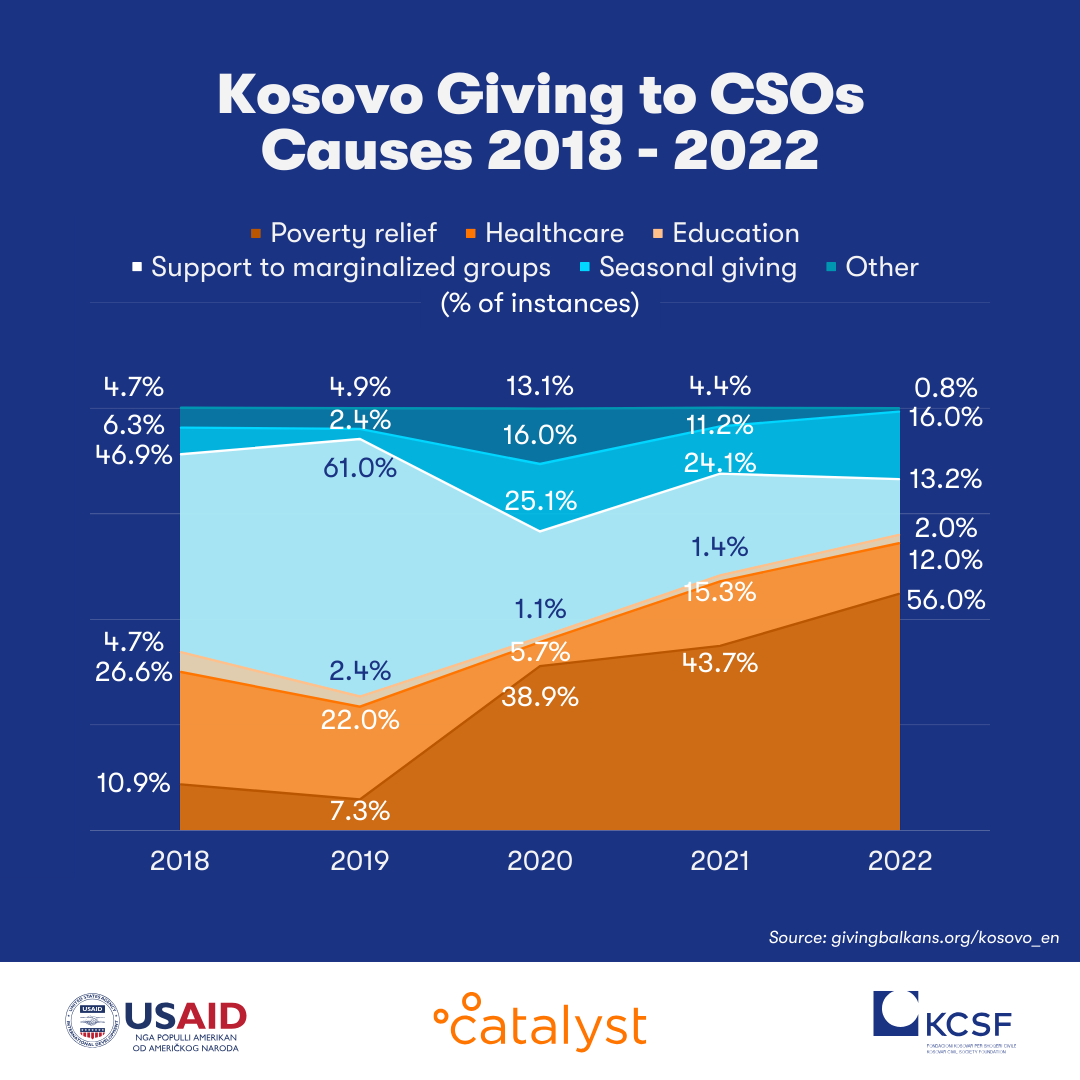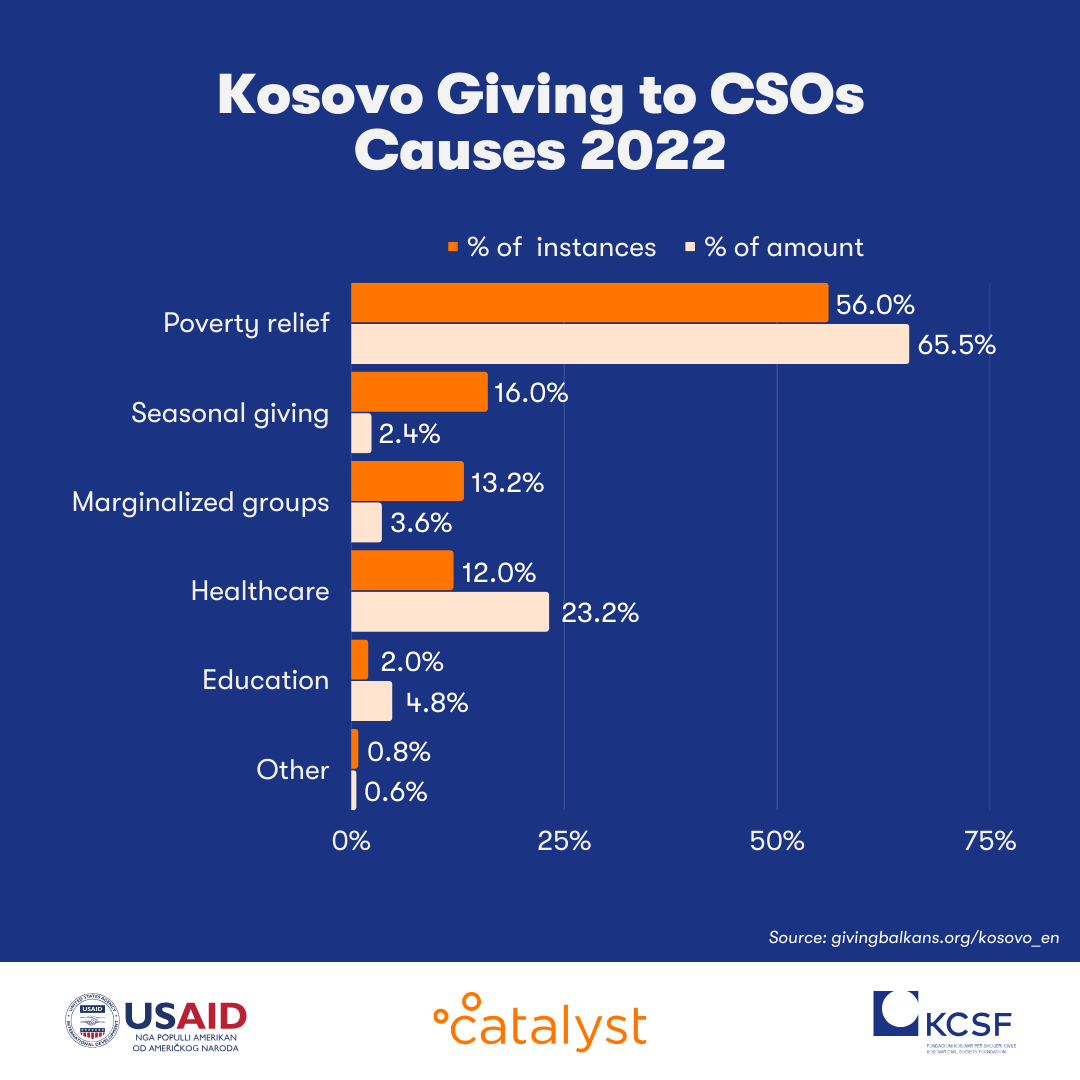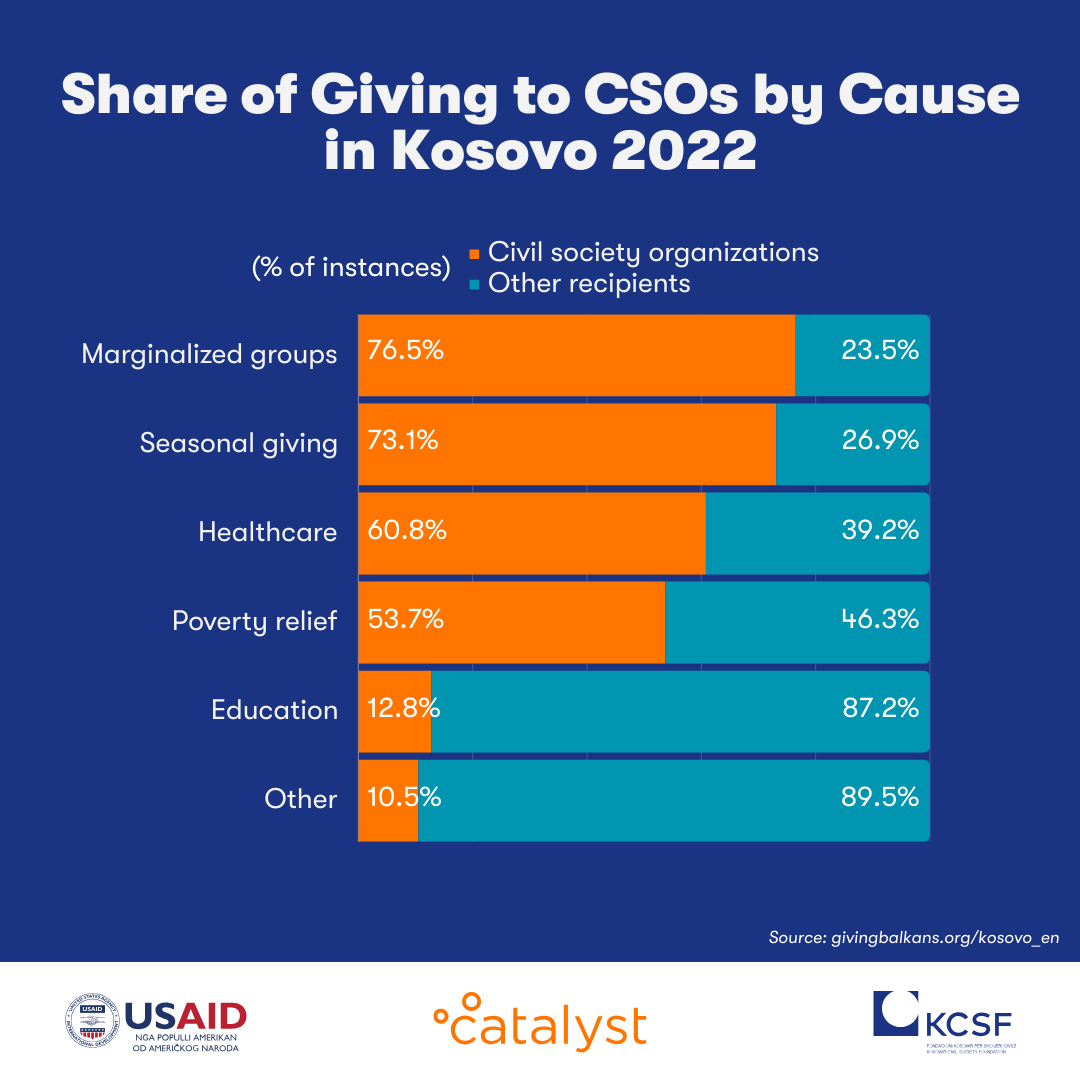From only 10.9% of recorded instances in 2018, poverty relief has been slowly raising support over the years to become the most supported cause in 2020 and now in 2022, with more than half of all donation instances directed to the CSOs. Recorded giving for healthcare has been gradually dropping over time, while the share of donation instances for support to marginalized groups started to decline after the COVID-19 pandemic in 2020.

Giving to CSOs: Causes of Giving 2018 – 2022 (% of all instances)
Giving to CSOs: Causes of Giving 2018 – 2022 (% of instances) – download this infographic in PDF
As aforementioned, in 2022, the largest share of support realized through the work of the CSOs was directed toward poverty relief (both donation instances and donated amount). The primary form of giving consisted of providing supplies and individual housing to socially disadvantaged people. All other key themes comprised less than half of the total number of recorded instances. Out of the less supported themes, seasonal giving stood out with an increase compared to 2021 and reached 16% of donation instances recorded for the CSOs in 2022.

Giving to CSOs; Distribution of Giving in Kosovo in 2022 by Cause
Giving to CSOs: Distribution of giving in Kosovo in 2022 by cause - download this infographic in PDF
Share of CSOs in Causes of Giving
Looking closely into the causes for giving on the general level in Kosovo in 2022 and the distribution of support to different types of recipients within each of the causes, more than ¾ of instances were directed to the CSOs in the framework of support to marginalized groups. CSOs play a crucial role in the assistance of marginalized groups. In this sense, CSOs can often be easily mobilized and respond quickly to the needs of vulnerable communities and provide immediate assistance, often reaching them faster than institutional support.
Secondly, CSOs were the prominent recipients of seasonal giving: 73.1% of all donation instances for seasonal giving were distributed through CSOs during state and religious holidays. A higher share of giving to CSOs than other recipients was also noted for giving for healthcare (60.8%) and poverty relief (53.7%). This implies that CSOs acted as primary intermediaries in collecting support for healthcare and poverty relief causes.
On the other hand, CSOs were not the primary recipients of the support of education in Kosovo – which is expected as this cause is mainly supported through giving to education institutions and individuals directly for scholarships and other less supported causes like culture and arts. In simpler terms, donations for education-related causes are less likely to have CSOs as intermediaries, as donors tend to direct them to educational institutions and individuals directly.

Share of CSOs in Causes of Giving (% of all instances)
Share of CSOs in Causes of Giving (% of instances) - download this infographic in PDF
Examples of Giving
Responding to the needs of socially disadvantaged families in Kosovo
In previous years, the Humanitarian Association “Bereqeti” has been spotted as one of the most active associations that support vulnerable groups of society. The association organized various actions in 2022, including the campaign “Sofra e Ramazanit 2022” (“Ramadan Table).” This initiative was organized in cooperation with the Islamic Community of Kosovo during the month of Ramadan, with the aim to provide food packages to socially disadvantaged families across Kosovo. Amongst the donors who supported the cause were companies: supermarket Lindi Center, Diamanti, Meka Halal Food, and AB Bajrami, as well as various individuals from Kosovo and diaspora donors.
Another CSO for which numerous actions were recorded in 2022 for the support of people in economic need and people in need of medical support was the Humanitarian Association “Jetimat e Ballkanit” (“Balkans Orphans”). In 2022, the recorded amount of around EUR 1.3 million was raised with the help of citizens, individual donors, and the business sector for providing new homes for more than 130 socially disadvantaged individuals. To support the provision of medical treatments for people with health issues, the association raised EUR 52,000 with the help of citizens through various campaigns.
Diaspora professionals contribute to the capacity building of CSOs
In 2022, GERMIN and the Kosovo Civil Society Foundation (KCSF) initiated the project for engaging diaspora professionals with the Citizen Engagement Activity implemented in partnership with the United States Agency for International Development (USAID). Within the program, three diaspora professionals provided their expertise in specific thematic areas for CSOs. One of the experts was Atifete Xhemaj, living in Belgium, who volunteered with the Kosovo Rehabilitation Center for Victims of Torture (KRCT) and helped contribute to the organization’s communication strategy. The energy expert Kreshnik Rama, from Sweden, developed an instrument for analyzing the impact of companies and organizations on the environment for the organization Sustainability Leadership Kosovo (SLK). Also, as part of the program, Kaltrina Durmishi, from Austria, volunteered at Teach for Kosovo and provided knowledge in the field of networking to support the educational activities of the organization.
More on Kosovo’s support to nonprofits in 2022:
- Kosovo Gives to Civil Society Organizations 2022
- Giving to Civil Society Organizations in Kosovo 2022: Citizens’ support
- Civil Society Organizations in Kosovo: The neediest in focus
- Short-term effects of Giving to the Civil Society Sector in Kosovo in 2022
- Download the infographic: What are the main causes of donations to CSOs?
This report is made possible by the generous support of the American people through the United States Agency for International Development (USAID). The contents are the responsibility of Catalyst Balkans and do not necessarily reflect the views of USAID or the United States Government.
The Citizen Engagement Activity in Kosovo is a five-year initiative implemented by Kosovar Civil Society Foundation (KCSF) in partnership with the United States Agency for International Development (USAID).


Leave a comment